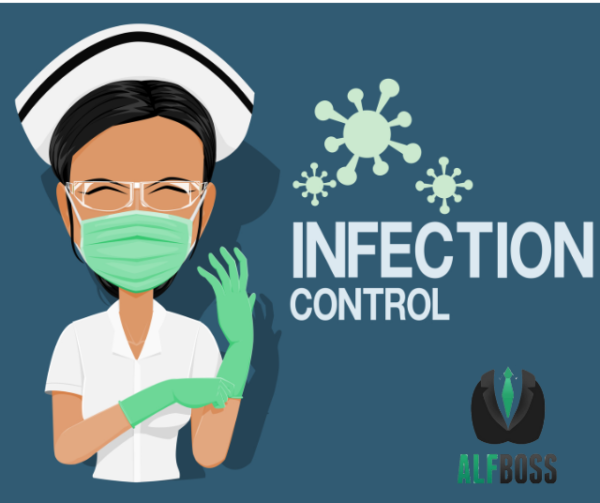
Combating the spread of infectious disease
At the time of writing this article, America is facing a pandemic like we have never seen before. COVID-19 has been responsible for over 500,000 deaths in the United States alone. Many administrators and nursing leaders had never imagined infection control would be at the forefront of our daily planning. If you adhere to the following regulation provided by ODH you will be sure to avoid potential issues with not just COVID-19, but many other infectious diseases:
Rule 3701-16-12 | Infection control; tuberculosis control plan.
(C) Each residential care facility shall establish and implement appropriate written policies and procedures to control the development and transmission of infections and diseases which, at minimum, shall provide for the following:
(1) Individuals working in the facility shall wash their hands vigorously for ten to fifteen seconds before beginning work and upon completing work, before and after eating, after using the bathroom, after covering their mouth when sneezing and coughing, before and after providing personal care services or skilled nursing care, when there has been contact with body substances, after contact with contaminated materials, before handling food, and at other appropriate times;
(2) If the residential care facility provides any laundering services, the facility shall keep clean and soiled linen separate. Soiled laundry shall be handled as little as possible. Laundry that is wet or soiled with body substances shall be placed in moisture-resistant bags which are secured or tied to prevent spillage. Laundry staff shall wear moisture-resistant gloves, suitable for sorting and handling soiled laundry, and a moisture-resistant gown or sleeved plastic apron if soiling of staff members’ clothing is likely. The facility shall use laundry cycles according to the washer and detergent manufacturers’ recommendations. Protective clothing shall be removed before handling clean laundry;
(3) Individuals providing personal care services or skilled nursing care that may result in exposure to body substances, shall wear disposable vinyl or latex gloves as a protective barrier and shall remove and dispose of the used gloves and wash hands before contact with another resident. If exposed to body substances, the individual who has been exposed shall wash his or her hands and other exposed skin surfaces immediately and thoroughly with soap and water. The facility shall provide follow-up consistent with the guidelines issued by the United States centers for disease control and prevention for the prevention of transmission of human immunodefiency virus and hepatitis B virus to health-care and public-safety workers in effect at the time. Individuals providing personal care services or skilled nursing care shall wash their hands before and after providing the services or care even if they used gloves;
(4) Place disposable articles, other than sharp items, contaminated with body substances in a container impervious to moisture and manage them in a fashion consistent with Chapter 3734. of the Revised Code. Reusable items contaminated with body substances shall be bagged, then sent for decontamination;
(5) Wear a moisture-resistant gown or other appropriate protective clothing if soiling of clothing with body substances is likely;
(6) Wear a mask and protective eye wear if splashing of body substances is likely or if a procedure that may create an aerosol is being performed; and
(7) Ensure that all hypodermic needles, syringes, lancets, razor blades and similar sharp wastes are disposed of by placing them in rigid, tightly closed puncture-resistant containers before they are transported off the premises of the facility, in a manner consistent with Chapter 3734. of the Revised Code. The residential care facility shall provide instructions to residents who use sharps on the proper techniques for disposing of them.
For the purposes of this paragraph, “body substance” means blood, semen, vaginal secretions, feces, urine, wound drainage, emesis, and any other body fluids that have visible blood in them.
(D) Each residential care facility shall appoint an individual with knowledge of the facility’s infection control plans to serve as an infection control designee and provide that individual’s name and contact information, including an electronic mail address, on an electronic system prescribed by the director.
(E) Each residential care facility shall develop and follow a tuberculosis control plan that is based on the home’s assessment of the facility. The control and annual assessment shall be consistent with the United States centers for disease control and prevention “Guidelines for Preventing the Transmission of Mycobacterium tuberculosis in Health Care Settings, 2005,” MMWR 2005, Volume 54, No. RR-17. The home shall retain documentation evidencing compliance with this paragraph and shall furnish such documentation to the director upon request.
Top Takeaways:
- Individuals working in the facility shall wash their hands vigorously for ten to fifteen seconds before beginning work and upon completing work, before and after eating, after using the bathroom, after covering their mouth when sneezing and coughing, before and after providing personal care services or skilled nursing care, when there has been contacting with body substances, after contact with contaminated materials, before handling food, and at other appropriate times
One of the single biggest factors in the spreading of infection is the failure to wash hands. Ensure you have the buy-in from all staff to practice effective handwashing techniques.
- (C) Each residential care facility shall establish and implement appropriate written policies and procedures to control the development and transmission of infections and diseases which, at minimum, shall provide for the following: 1-7
Developing a written infection control policy is key to decreasing the spread of infection. When staff is trained on the policy and it is drilled into the daily practices you will be sure that it is an effective program.